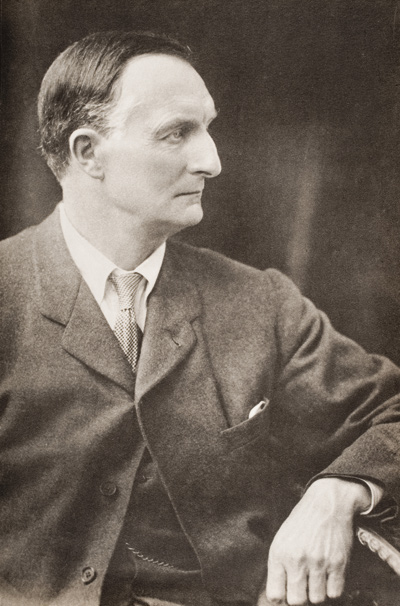The photograph on the jacket, reproduced above, says it all — or at least all of what most of us think we know about Sir Edward Grey. Patrician, reflective, dignified, he stares into the future with the uncompromising honesty of one who has never even contemplated straying from the paths of rectitude. In fact, he was more interesting than that, but Michael Waterhouse’s thoughtful biography reveals that the image and the reality were not so very different.
Grey’s private life was a little more chequered than might have been expected. Though properly cautious about what can be no more than surmise, Waterhouse credits Grey with several extramarital affairs and at least two probable bastard children. Given, however, that his first wife — whom he loved devotedly — eschewed any sort of sexual relationship, he can hardly be blamed for looking elsewhere. He conducted his affairs with admirable discretion and good manners.
It was his honesty, his integrity, which most impressed his contemporaries. The German ambassador, Paul Wolff-Metternich, found himself at odds with Grey over many important issues, but he never doubted that he was dealing with a man of honour. Grey ‘gives me the impression of being a frank, straightforward man,’ wrote the ambassador. ‘One knows where one is with him.’ He was accepted by everyone as being a man of his word: ‘sound, temperate and strong’, wrote Asquith — not the most colourful of attributes but particularly estimable in a politician.
For a man who seemed so cautious in his views, he could be surprisingly radical. He had doubts about the Boer War. ‘I am depressed about this war,’ he told a friend. ‘I admit the necessity of it and that it must be carried through but it has no business to be popular.’ He championed votes for women and favoured the abolition of the House of Lords; he was ‘an odd mixture of an old-fashioned Whig and a Socialist,’ remarked Balfour.
As Foreign Secretary, his first priority was to be on good terms with the French. Anglo-French relations had been notably strained towards the end of the 19th century; Grey believed that the issues which divided the two countries were trivial compared with their common interests. ‘We wish to keep and strengthen the Entente with France,’ he told Theodore Roosevelt in 1906.
After France he concentrated — a harder task — on fostering friendship with Russia. Yet this had to be done without giving Germany grounds for feeling that it was being encircled. The task proved impossible. The Kaiser, egged on by Tirpitz, was convinced that the future of Europe would in the end have to be settled by arms. If Grey had made it unequivocally clear that, in the last resort, Britain would side with France, war might have been postponed — it could not finally have been averted. ‘I hate war! I hate war!’ Grey blurted out to his permanent under-secretary, after he had returned from persuading the House of Commons that it was inevitable. It was a tragic irony that this most pacific of men should have taken his country into the most horrible of wars.
Grey was one of the few successful politicians who could say with honesty that he would far rather have been doing something else. He was a passionate fisherman and ornithologist, never happier than when staying in his cottage on the Itchen or in Northumberland beside the burns of Fallodon. This was of enormous importance in his life and, incidentally, enhanced his standing in Whitehall, where everyone knew that, if he was crossed on any important matter, he might resign with relief and take off for the country.
Waterhouse rightly makes much of this. The prime interest of his book, however, will be for those concerned with politics and foreign affairs. Few of his readers will wish to be told, every few pages, that Grey had ‘caught 11 trout, including one of 2lb 4oz on a Grey Quill. He fished the Aquarium to the Top Water ….’ As for the nesting habits of the lesser speckled chiff-chaff, only the most ardent twitcher would relish the detail that Waterhouse supplies.
This book does not make for easy reading. Waterhouse’s pace is relentlessly unvaried. His prose is leaden. He rejoices in clichés: pins are heard to drop, bridges are built, and Grey watches with a hawk-like eye and in deathly silence as the train, inevitably, hits the buffers. Waterhouse favours the portentous phrase. Haldane ‘commenced his deliberations’ at the War Office. Why can’t he just start work?
But the book is still worth reading. It is a well-researched and admirably fair account of a man who, for more than 15 years, played a critically important role in the formulation of British foreign policy. No Englishman could have prevented the 1914-18 war. Grey got as close to it as anyone could have done, and Waterhouse should be thanked for reminding us of his existence.






Comments